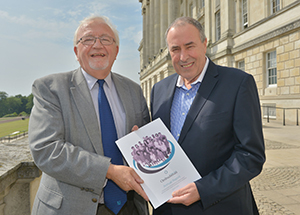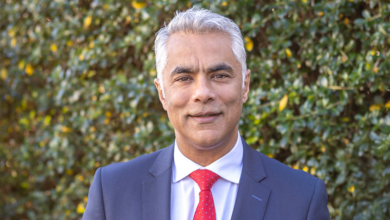Improving the public sector
Recently retired Northern Ireland Ombudsman Tom Frawley talks to Adam Morton about the evolution of Northern Ireland’s public sector, the challenges it currently faces and what he hopes will be his legacy.
 Northern Ireland’s public service operates in a very different environment today than it did when Tom Frawley started his career in 1971. Frawley has watched as the public service has gone through radical reform, reorganisation and restructuring. He has witnessed the era of public deference to senior administrators come to an end and the transition from an administrative culture to a managerial culture. While Frawley is certain this transition has had many benefits, he notes that the language of business and its focus on cost has resulted in a depreciation in the ‘value’ of the public sector.
Northern Ireland’s public service operates in a very different environment today than it did when Tom Frawley started his career in 1971. Frawley has watched as the public service has gone through radical reform, reorganisation and restructuring. He has witnessed the era of public deference to senior administrators come to an end and the transition from an administrative culture to a managerial culture. While Frawley is certain this transition has had many benefits, he notes that the language of business and its focus on cost has resulted in a depreciation in the ‘value’ of the public sector.
Frawley’s career began in 1971 when he joined the National Health Service. In 1985 following the implementation of the Griffiths report he was appointed the Western Health and Social Services Board’s General Manager. A series of fellowships led to health care study visits in Australia, New Zealand, the USA and Zimbabwe and in 2000 he took on the role of Northern Ireland Ombudsman.
As Ombudsman Frawley had to deal with many complaints but remains positive about the overall impact of Northern Ireland’s public service. “It is by no means perfect but our public services deliver good quality and achieve great things every day,” he states.
Challenges
Looking to the future, Frawley believes there are three crunch areas that the public service must seek to address. These are the health service, the lack of affordable housing and the ability of the public sector to facilitate community and societal integration.
With his experience of health services across the globe, Frawley states that the only way Northern Ireland’s health service can move forward effectively is if the issue is depoliticised. “We need to find a consensus because otherwise we make really good analysis like we did with the Transforming Your Care initiative, but then we fail to implement the initiative and are unable to deliver the essential change.
“There appears to be a lack of awareness of the connection and dependencies different departments have with each other,” says Frawley. Using the example of the Department for Regional Development and the Department of Health, Social Services and Public Safety, Frawley explains how an improved road network will allow for the rapid delivery of patients to treatment. Instead of simply building hospitals there is a need to build modern highways and rapid access areas. “It is not an answer to everything but to redesign hospitals without huge investment in ambulance services and transport infrastructure does not make sense.”
While the other two crunch areas Frawley identifies are challenges in their own right, he notes that one can not be solved without the other. While acknowledging the huge achievement and advances that have been made in the provision of social housing in Northern Ireland over the past 45 years he warns against not maintaining the level of investment that has been previously afforded to social housing.
Frawley notes that in certain areas affordable housing is available for young families but Northern Ireland’s deep societal divisions mean these houses may remain empty. Creating the environment for a community and society to be at ease with each other is the third area Frawley believes must be tackled. “The level of separation we have at present is not sustainable,” says Frawley. “Our current integration levels are not a reflection of a modern society. That takes you into subsets of very difficult issues like bringing down the walls and how we organise our education system. There is a real public service cost to division and with all the other challenges we have it is becoming less and less affordable.” Admitting he does not have the answer to solving these problems Frawley wants to see the public service think outside the box and work together effectively to tackle these issues.
 Effective delivery
Effective delivery
This concept of thinking broadly about issues across different aspects of the public service is almost non-existent in Northern Ireland. As to why this is the case, Frawley believes the management mentality currently present in public offices is largely to blame.
“Once people have a job as a Chief Executive or senior manager they build a protection around themselves that says this is our space, this is our organisation,” Frawley observes. “We need to remind ourselves that what we have is in fact a stewardship role. Working together should be easy here in such a small territory but this cooperation requires political and managerial leadership that isn’t obsessed with whose name is on top of the stationery.”
While cooperation among managers is important, Frawley is also acutely aware of the importance of investment in the frontline. The frontline is where citizens interact with the public service and it is this interaction that determines if they perceive the level of service they receive to be good or bad. As such it is a necessity to ensure those on the frontline are trained to communicate clearly and effectively with the public they serve, especially with the level of scrutiny the public sector now faces.
“The public sector now has a level of transparency and scrutiny that was not present 20 years ago and this is a good thing but sometimes mistakes get magnified and failures highlighted. The most excellent outcome can be achieved but all people will remember is the rudeness they received or the quality of the catering. These details, that may seem insignificant, become proxies for a good experience,” warns Frawley.
“Quite often people do not complain to this office because they want someone punished, people complain because they feel they need a better explanation, they do not feel that their engagement with the provider has given them the clarity or completeness they anticipated and that is why investment in the frontline is so important.”
Legacy
As Chair of the panel of experts that was appointed to support the Review of Public Administration, Frawley recognises that the original ambition of the reform process has not been fulfilled. However he believes the compromise that was reached was necessary and that what is in place now is an effective solution.
“Part of the problem of the whole public system is that sometimes we analyse the structures without thinking about the human side of it. We neglect to assess if we can run the services in the new level of complexity that is being created,” Frawley muses. “The new local government arrangements provide a tighter structure that is better able to accommodate functions like planning and economic development. The reform has created a platform for a series of opportunities, the challenge now is how far we are both motivated and equipped to realise and harvest them.”
Having served the public for 45 years Frawley has a few regrets, mainly the inability to implement legislation allowing public offices to apologise without it being taken as an admission of liability. Another of his failed ambitions is the establishment of a Northern Ireland Institute of Public Management that would allow both the civil and public service to train together fostering a single culture and value system that would benefit everyone in Northern Ireland.
Looking back over his career, Frawley reflects on some ‘interesting and satisfying times’ and credits his longevity to working with fantastic people who ensured that despite challenging times he was always eager to return to work the following day. For Frawley, the defining moment of his career and his legacy will prove to be the creation of the Northern Ireland Public Service Ombudsman.
After 13 years of work the new body came into force at the start of April and gives the citizens of Northern Ireland one of the most modern ombudsman’s offices in Europe. The legislation supporting the creation of the office provides it with new jurisdictions like ethical standards in local government and ensures that the new office will become the complaints authority for Northern Ireland.
Significantly, the office will have the power to act on its own initiative and will investigate complaints about health, housing, local government and education sectors. The public will also be able to complain to the Ombudsman about the Audit Office and the Assembly Commission. “It’s a whole new piece of legislation with 13 clauses that has been taken on board by our politicians in a detailed way,” enthuses Frawley. “Thanks to this Bill we will have a very effective office going forward and I look forward to seeing my successor (Marie Anderson) building on the opportunity it provides to create an accountable and effective public service that is focused on providing a remedy for citizens and on improving public services.”





